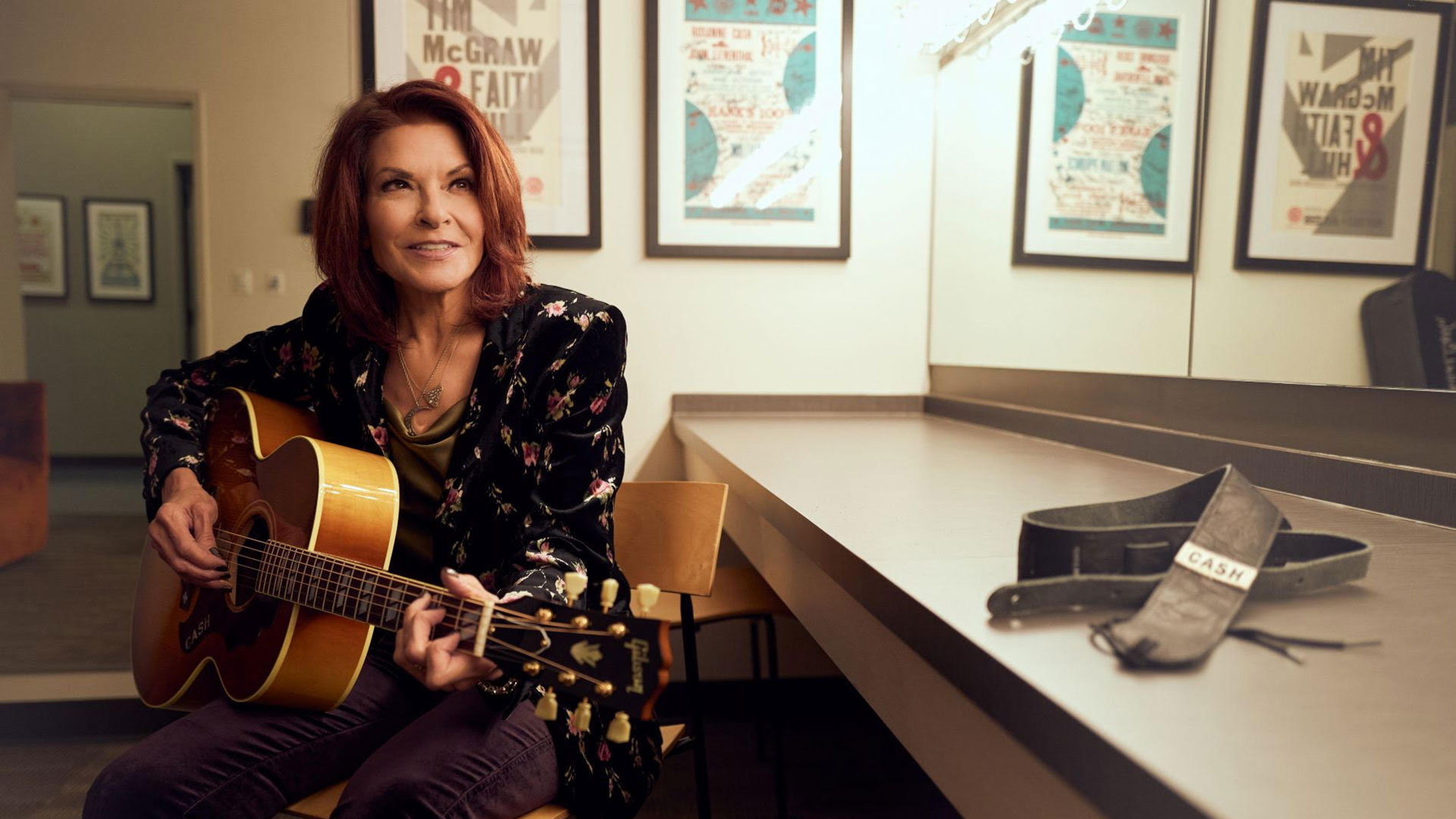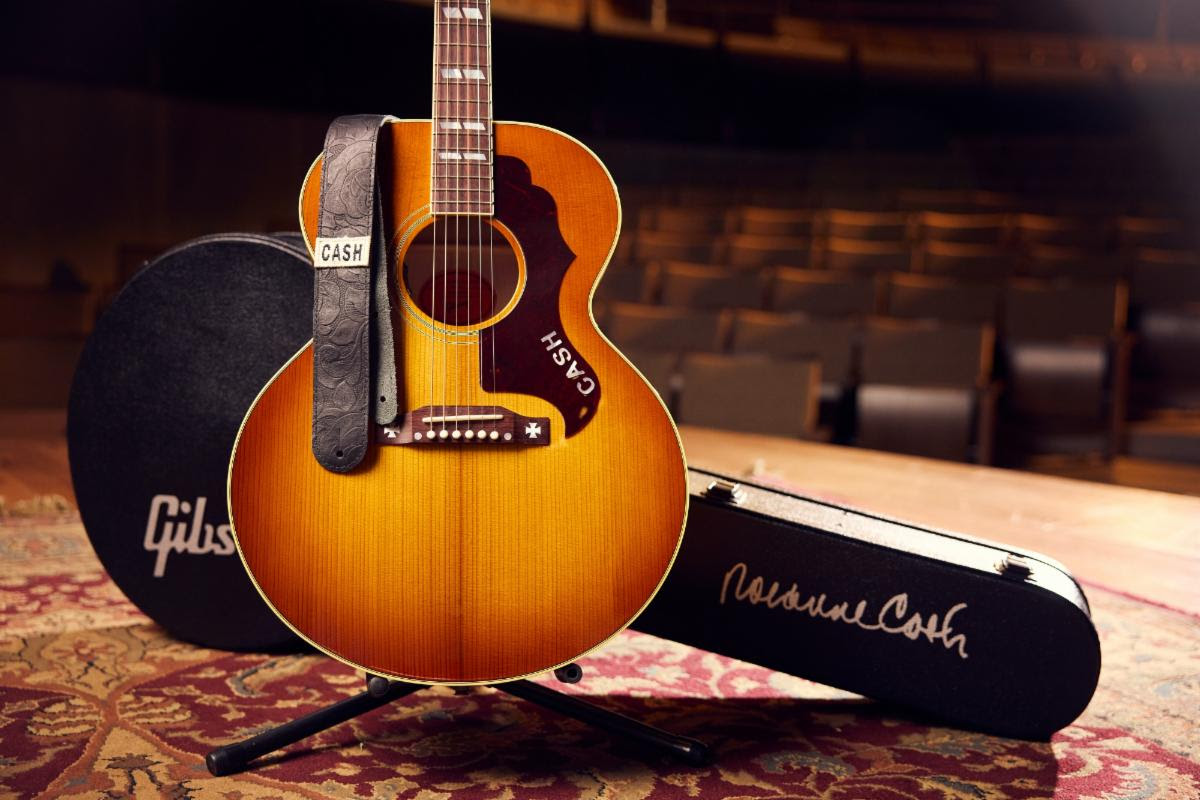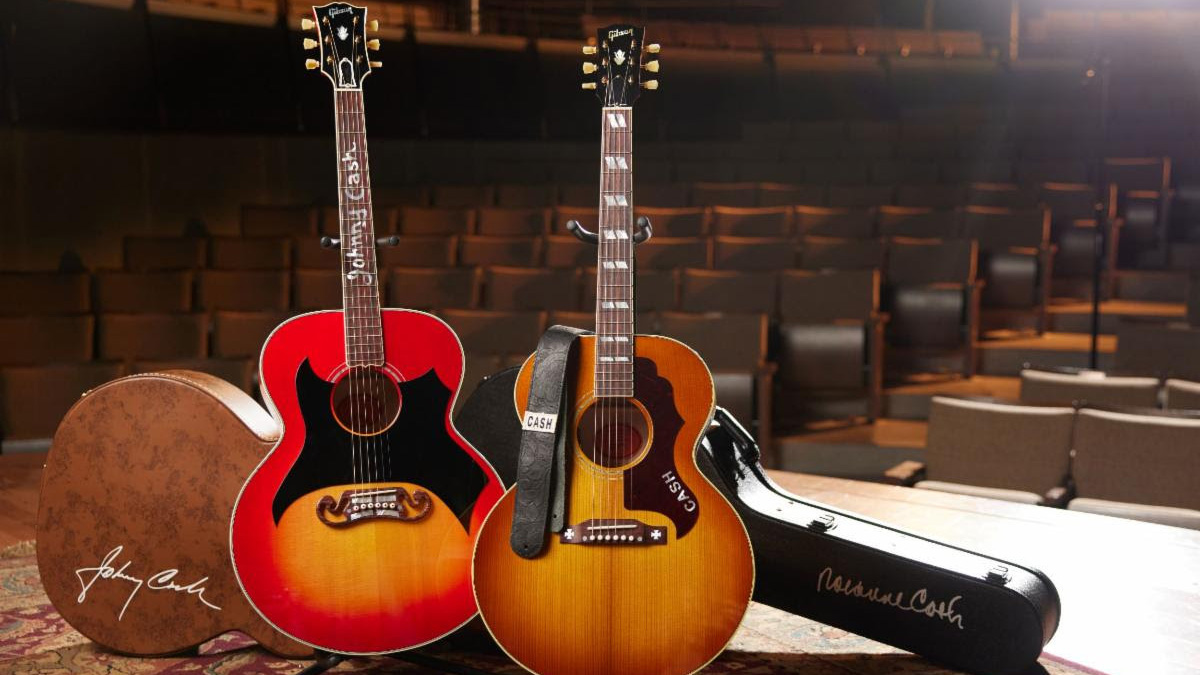“I just loved mushrooms. My dad thought it was hysterical, so he had the freaking guitar made with a mushroom on it”: Rosanne Cash on learning the ‘Carter scratch’ technique, her most valued guitar gear – and recreating Johnny Cash’s iconic SJ-200
As the country icon is celebrated with a new exhibit at the Country Music Hall of Fame – she discusses her playing lineage, the two new Gibson signatures and sewing Johnny's Air Force patch to her strap

In early December, the Country Music Hall of Fame launched an exhibition celebrating Rosanne Cash – and she is still reeling from the honor. “I felt a little nervous – I didn't want it to feel like an end-of-life review,” she admits. “But ultimately, it was really moving.”
She was also honored by Gibson, who this year dropped her signature J-185, paired alongside a faithful recreation of her father Johnny Cash’s classic SJ-200. Gorgeous as they are, Cash isn’t precious about gear.
“They’re made to be used,” she tells Guitar World. “There’s no need to put them in a glass case on the wall and never touch them. I don’t get that. If you get a vintage guitar, it has songs already in it.
“It’s got something about who owned it, how they played it and what they wrote on it. It’s like having a little time travel in your hands – a connection to the past, to somebody you respected.”
The J-185 isn’t her first signature guitar; there’s also a namesake Martin OM-28 – another of many things she shares with her dad when it comes to guitars – but there are differences too: “I can play barre chords, and my dad couldn’t!” she laughs.
“When he wasn’t strumming he was humming. He always had this rhythm going; he was a great rhythm player. His timing was fantastic, and hopefully I learned a bit of that.”
She also took style cues from her mom June Carter’s side of the family. “The Carter women taught me the Carter Scratch when I was 18, and I developed a way to play that’s kind of a variation of that. My dad didn’t do that; he had more of a thumb rhythm.
Get The Pick Newsletter
All the latest guitar news, interviews, lessons, reviews, deals and more, direct to your inbox!
“And once in a while I play single notes. I don't know if I ever heard him do that, except a G walked down to an E minor...”
You’ve got a new signature Gibson J-185 alongside a recreation of Johnny’s SJ-200 out. How did those come about?
“Gibson said they’d love to reissue my dad’s iconic guitar at the same time as a signature model for me. At first I was afraid of getting too close to my dad’s model. But then I spoke about it with my husband [musician/producer] John Leventhal, who said, ‘No, this is a good idea. Let’s do this!’
“It was a year-long process of talking to the guys at Gibson and deciding on a J-185 for me, which is a smaller model, and then going into design details. My dad’s is kind of an aggressive color, that bright orange. I knew I wanted more of a honeyed tone for mine that was just softer.
“Then we got into the wood. John advised me because he knows more than I do. The pickguard was a big deal because my dad was very angular and aggressive. That’s not a negative word; it's masculine and out there – it comes to you. But I wanted something more curved, with a more feminine shape. So we went back and forth a few times.”
There’s an association between one of your old guitar straps and the name on the pickguard, right?
“They wanted the name on the pickguard. The font is copied as close as they could get from a guitar strap, which came to me after my dad died. I inherited his desk, and I was looking in the drawers and I found this patch. It just said, ‘Cash.’ It was from when he was in the air force. It was so moving to see he’d saved it all that time.

“I took the patch to a guy who could sew it on a thick leather strap, and I used that strap on the road for years – until one night. I was playing in New Hampshire, and I dreamed that the strap got stolen. I woke up and I was literally shaking.
“I went to soundcheck that day and said to my tour manager, ‘I have to take that strap off the road. He said, ‘Oh, thank God – I worry about it all the time!’ I took it home and had a copy made that I could take on the road.
My dad wasn’t precious; no matter how valuable the guitar was, he used it as a tool and an extension of the joy in his life
“When Gibson said, ‘We want to put “Cash” on the pickguard,’ I said, ‘Copy the patch.’ It’s very meaningful to me. That strap and one of the guitars are in my exhibition at the Country Music Hall of Fame.”
What other specs are important when putting together a guitar?
“The most obvious spec is that my guitar is smaller. I’m only 5’ 4” and couldn’t do an SJ-200. Even a dreadnought is a little unwieldy for me. This is the perfect size and I love it so much.

“The balance between warmth and being able to cut on stage is one of the things I was really nervous about. I want a warm tone, but it’s got to cut through; and it’s just beautiful the way this guitar cuts through. When you open the case, you just pray it’s going to sound as good as it looks – and it does!”
What were your observations on how Johnny treated his guitars?
“He was casual with his guitars. He had them all around the house. He wasn’t precious in any way; no matter how valuable the guitar was, he used it as a tool, and as an extension of the joy in his life.
“He wasn’t a collector like other collectors, although he really appreciated a great-sounding guitar and the providence of a guitar. He always had them on stands in his bedroom, in the living room, on the wall; they were everywhere.”
What’s the most notable guitar you inherited from him?
“There’s this late-19th century Martin parlor guitar that belonged to Maybelle Carter. I love that guitar. It doesn’t sound great; it needs a lot of work. I’m afraid to have work done on it because it's so fragile. But it’s a really sweet guitar.”
Do you relate to guitars like your dad did?
“I guess. I’m looking round my living room now and there’s three guitars. Two are leaning against an amp, and one’s on a stand near the piano. But if I go down to the studio, John has over 100 down there. Maybe 20 of them are out and the rest are in cases. He’s more of a collector than I am, but he uses all of them.”
You seem to have a great relationship with Gibson. Did your dad work closely with their guitar builders?
“I can’t tell you, because that guitar was created when I was still pretty young. But as far as his black D-35, he said [luthier] Dick Boak called him one day and said Martin wanted to do a signature guitar for him. He kind of paused and said, ‘I’ve been waiting for this phone call my whole life.’
I just loved mushrooms… He thought it was hysterical, so he had the freaking guitar made with the mushroom on it
“I’m certain he was involved in the design of that one. I have one that I donated to the Country Music Hall of Fame. But I’ve got to tell you that he commissioned a Ferrington for me in my early 20s. It had kind of a honeyed tone and a mother-of-pearl mushroom set in the front.”
A mushroom?
“At that age I just loved mushrooms and ate them all the time. Not psychedelic mushrooms – actual mushrooms! He thought it was hysterical, so he had the freaking guitar made with the mushroom on it. It’s also in the Hall of Fame exhibit.”
Are there any plans to reissue any more of Johnny’s guitars?
“I don’t think so. I don’t want it to become a thing that I keep doing; that would make it less special. This pairing of our Gibsons, I think, is an incredibly sweet, beautiful, and elegant gesture. But I don’t want it to become a trope. But I love the Gibson guys. I would work with them again in a minute.”
- The Country Music Hall of Fame’s Cash exhibition runs until March 1. A companion compilation album, The Essential Collection, is on sale now. For more information on the guitars, head to Gibson.
Andrew Daly is an iced-coffee-addicted, oddball Telecaster-playing, alfredo pasta-loving journalist from Long Island, NY, who, in addition to being a contributing writer for Guitar World, scribes for Bass Player, Guitar Player, Guitarist, and MusicRadar. Andrew has interviewed favorites like Ace Frehley, Johnny Marr, Vito Bratta, Bruce Kulick, Joe Perry, Brad Whitford, Tom Morello, Rich Robinson, and Paul Stanley, while his all-time favorite (rhythm player), Keith Richards, continues to elude him.
“Such a rare piece”: Dave Navarro has chosen the guitar he’s using to record his first post-Jane’s Addiction material – and it’s a historic build
“The best guitar player I ever heard”: Nashville guitar extraordinaire Mac Gayden – who worked with Bob Dylan, Elvis, Linda Ronstadt and Simon & Garfunkel – dies at 83






![[from left] George Harrison with his Gretsch Country Gentleman, Norman Harris of Norman's Rare Guitars holds a gold-top Les Paul, John Fogerty with his legendary 1969 Rickenbacker](https://cdn.mos.cms.futurecdn.net/TuH3nuhn9etqjdn5sy4ntW.jpg)





